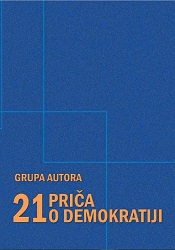Demokratija, odgovornost i mediji
Democracy, responsibility and media
Author(s): Koča Pavlović
Subject(s): Media studies, Communication studies, Government/Political systems, ICT Information and Communications Technologies
Published by: Centar za građansko obrazovanje (CGO)
Keywords: democracy;: responsibility; media;
Summary/Abstract: In contrast to standing of Montenegrin printed media, which can be estimated as good thanks to existence and work of two daily newspapers „Dan“ and „Vijesti“ and a weekly „Monitor“, the situation in the sphere of electronic media is worrying, since they have imponderably bigger influence, and this represents a huge obstacle in democratic shifts in Montenegro. Electronic media are noticeably falling behind in the view of transparency and objectivity of their reporting. The explanation of this situation can be retrieved in circumstances in which „media reforms“ have started in 2002 - as a weapon for fight of DPS against Montenegrin opposition, but also in opacity of their process of implementation. Thanks to control it had over significant part of civil sector, as well as benevolence of involved international institutions, ruling Montenegrin coalition has succeeded to, through positioning of its staff, take control over newly formed administrative structures of Public Broadcasting Service of RTCG and key independent regulatory body - Broadcasting agency. State radio and television have afterwards again become more promoters and apologists of the ruling coalition’s politics than an attempt of complete, impartial and well balanced informing of citizens regarding relevant matters. At the same time, treating the issues of legal state status and relationship with Serbia as an only priority, public broadcasting has helped and is intensively helping DPS to create, from the story on legal state status, a media curtain behind which Montenegrin reality is going on: organized crime, corruption and extremely questionable and opaque privatization. Comprehension of journalism as conducting of politics by way of other means is perishing difficultly and slowly in Montenegro. Large number of journalists is still interpreting freedom of information as their freedom to express personal views and personal prejudice. „Creation of public broadcasting service demands that its management and staff share the values of that idea, which again demands redefinition of journalism in transitional Europe“- states Professor Roman Jakubovic when writing about current situation in our region. Thanks to dedicated work of Secretariat for information of the Republic of Montenegro and anti Milosevic efforts of foreign donors the space of commercial broadcasting has developed during the last decade of previous century, under full control of current Montenegrin authorities. Private electronic media have for years been corrupted since they were exempted from obligation to pay the rent of frequencies and devoid of control of legal financial operation, and they have „paid“ that dept by being cooperative during numerous electoral campaigns. This approach has created something that is being recognized as Montenegrin specifics: financially powerful owners of economically unsustainable media projects.
Book: 21 priča o demokratiji
- Page Range: 163-172
- Page Count: 10
- Publication Year: 2005
- Language: Montenegrine
- Content File-PDF

